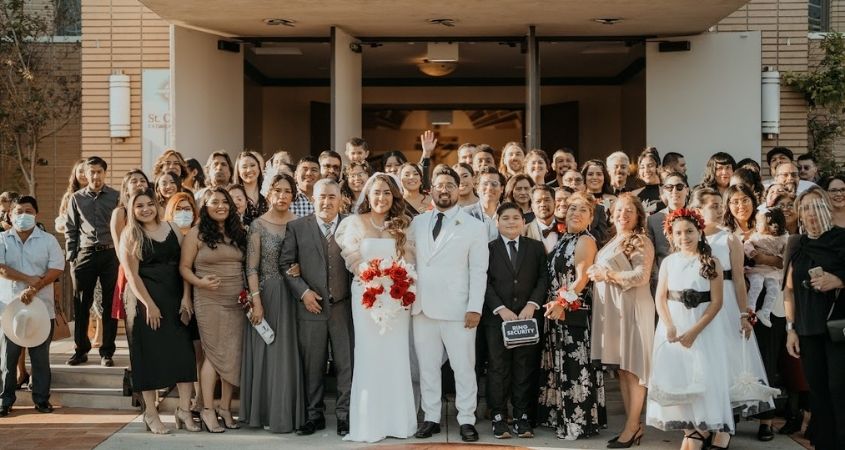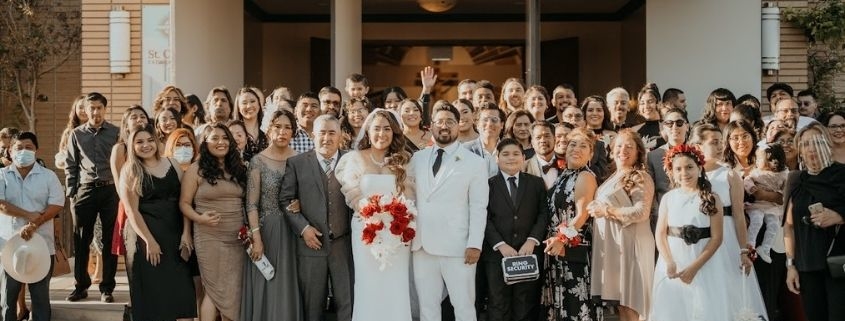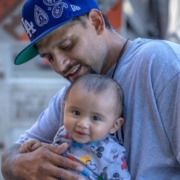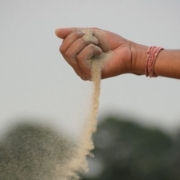Day 18: Hoping Against Hope
BY COLIN MARTINEZ LONGMORE | March 19, 2022
Today’s Readings
On December 11, 2021, my wife and I were married at our home parish, surrounded by the prayers of the community that raised us. After the big day, we eagerly shifted our focus to the next chapter in front of us: starting our household. We kicked off the New Year with a blank canvas, ready to create our version of a Holy Family.

My wife and I are first generation Americans and college graduates. Thanks to the incredible sacrifices of our parents, and several strokes of good fortune, we suddenly found ourselves in the position to do what our families could not: build wealth. As we combined our budgets and dreamt about our future, it was not lost on us that the price of the solid foundation we were building was paid for by a previous generation. We were grateful and, in many ways, we were lucky.
In our country, the reality for many families, particularly Black and Brown ones, is that building generational wealth is an increasingly fleeting reality. This is not by accident. Racist policies such as subminimum wages, red-lined neighborhoods and under-resourced schools are a few of the historical sins that have sapped the ability of marginalized families to stay afloat and get ahead. In fact, as of 2019, the median wealth of White families was about five times that of Latino families, and about eight times that of Black families.
This type of inequality doesn’t just hurt our country, it hurts the broader Body of Christ by undercutting the efforts of families to provide economic stability for their descendants. Crafting a society rooted in equity will require patient and faithful work from many generations. But while the obstacles may be daunting, we can be sure, hoping against hope like Abraham, that our seeds will one day bear fruit.
For Reflection:
- How have you benefited from the efforts of previous generations?
- How have you seen systemic inequality manifested in your community?
- To which dreams for future generations do you hope to contribute?
Colin is the Communications Coordinator at NETWORK Lobby for Catholic Social Justice in Washington D.C. He has served as the Advocacy Chair for the Ignatian Family Teach-In for Justice and taught classes at Georgetown University’s Capitol Applied Learning Lab. Previously, he worked for seven years as a youth minister in the Roman Catholic Diocese of Orange leading bilingual faith formation programs, hosting retreats, and speaking at various Diocesan youth events.









For future generations I hope to support pay equity and job equity by the policies I support in the government and the way I am in the world in which I live. I will share in both the suffering and joy that comes from helping those less able to receive those blessings so readily had by others. I will offer my gifts and abilities so others can experience theirs in the world in which they live. I will attend to others gifts and encourage and compliment the many abilities they have. . I will find ways to notice what they do and how to bring to light their gifts. I will do this with the help of the Father, His Son and the Holy Spirit..
I just can’t believe that God calls us to build individual material wealth. I’m focused on building community where you don’t need to be wealthy to feel secure that you will be taken care of.
For me it is about working for ethical companies. Or choosing the lesser of two evils. Do I choose to work for a campany which grows organic apples for exports and increases their own financial profit by employing cheap temporary migrant labour from overseas? Or do I work for a company which sprays their apples with chemicals to grow food for the local market, employing New Zealand residents and helping to put food on the table for other New Zealanders? I chose the latter. Even though I can’t personally eat these apples because of my sensitivity to chemicals. I can however work alongside those who have no homes to live in and sleep in tents and cars, because it is not possible to pay for rent on minimal wages.
As an immigrant who arrived at this country at the age of 14 with only a small suitcase of clothes, what I try to do is raise awareness that, as christians, our purpose in life is not to make lots of money and then feel good about ourselves but “donating” to the less fortunate. It is a matter of changing minds and structures so that all may have a shot at a decent life.
I appreciate this reflection’s inclusion of the reality of generational wealth and it’s uneven distribution. I have felt the particular calling to not see it as familial generation wealth but more community generational wealth. And so establishing a Donor Advised Funds and giving significantly to charity is a response my family and I are taking.
Not to lose the land which has been in the family for several generations was what my generation was given as our task. None of us can afford to buy each other out, and all of us are trying to be good stewards. Luckily, we were pretty old when we were passed the reins, and we are mostly stable. So far we are able to pay the taxes. We were lucky to be given college educations, which would not have been possible before Title 9 and acceptance of more women into academic life. It might not be possible now, if one is trying to consider sending a big group of children through private colleges. Also, I tried to become part of the group “La Raza” at my university in the early 70s, and they rejected me because I did not come from the refugee/immigrant population who were suffering disrespect, and had faced so much hardship and trauma. I have “given back” through my career and vocation as a physician, and I have supported social justice causes, all my life; but also I want to preserve my heritage. So this is always a difficult subject for me. WWJD? Each of us does what we can. We have to consider the rest of the family in our deliberations. We also need to consider the needs of our communities, not just our church group but the wider community, the multicultural diversity, the needs of our neighboring countries — Mexico and Latin America– which have been so underserved in our foreign policy, and the needs of the planet. It is a great blessing that Pope Francis began his papacy with Laudato Si. We need to keep paying attention to that document, and to make stronger efforts to help support the needs of our planet. I was in the Peace Corps after college for 2 years, and that experience helped shape me. This is our hemisphere, and this hemisphere is mostly Christian. We need to beef up diplomacy and international action, because we are Christians, to help our neighbors in our own hemisphere, so that people can feed and educate their children, so that they don’t have to come here as starving refugees fleeing violence and trauma, and all that that entails. This is a tremendous task, which is going to take huge effort and resources. Paul Farmer MD was my hero, and a fabulous role model for working with the “preferential option for the poor”– but he was so saintly, in his single-minded efforts, and his miraculous energy level; most of us could never begin to do what he did. It is good to keep trying to work together, trying to help each other have stamina and resilience.
I’m embarrassed to say that it’s only been in the last two years that generational wealth, or lack thereof, has impacted the wealth gap in our country. Thank you for your reflection and sharing your real life dreams and experience.
Beautiful reflection
Despite all difficulties and hardships, previous generations loved Planet Earth our Common Home. The current and future generations will need to re-think how best we can add life to the life span of Planet Earth.